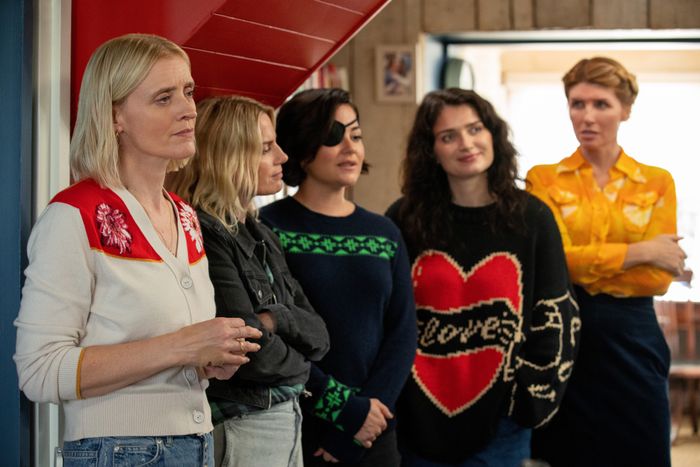
The second season of Bad Sisters opens on a familiar note: The Garvey sisters screeching through their panic. Parked precariously close to the edge of a cliff, Eva, Ursula, Bibi, and Becka open the boot of their car to peer at what looks like a corpse inside. Movement inside the vehicle sends them screaming and scurrying out of frame. Cut to the opening credits. Here we go again.
High-level anxiety attacks are a trademark of Sharon Horgan’s darkly comedic Apple TV+ series, which in season one focused on the siblings’ repeated attempts to bump off their abusive brother-in-law, JP. Ultimately, the fifth and most kindhearted Garvey sister, Grace (Anne-Marie Duff), got the job done, murdering her dastardly husband and staging what appeared to be an effective cover-up with the help of her sisters and neighbor Roger (Michael Smiley). It was a satisfying resolution for a season of TV intended to be a limited series like its source material, the Belgian series Clan.
And yet, shortly after it completed its run in late 2022, Horgan, who also stars as Eva, hinted at an interest in making more episodes. “I’m not saying that story isn’t out there,” she said, “but you would have to have a really good reason to bring it back.” True to Horgan’s word, Bad Sisters returned this week with a dramatic two-episode premiere. It’s still a story of feminine vengeance set against the backdrop of gorgeously windy coastal Ireland. But because it spent so much time in its first season establishing the main characters’ backstories, this season is able to barrel ahead with the story. These eight new episodes spend less time delving into the individual lives of each sister and more on how they’ll avoid law enforcement while making more of the misguided decisions that only implicate them further. Add a shocking turn of events at the end of the second episode, and the stakes have never been higher for this hapless family.
The season begins by resurrecting the cops’ interest in the circumstances surrounding JP’s death at precisely the moment Grace finds a happily ever after with new husband Ian (Owen McDonnell). The remains of JP’s father, killed and hidden by his awful son years earlier, wash ashore, leading police to start sniffing around the Garveys once again. It’s a believable — or at least believable enough — jumping-off point for a new story, and, crucially, an immediate hook to invest viewers in what comes next. After witnessing Grace’s suffering through ten episodes of season one, watching her prepare for her wedding reminds us how desperate we were to see her happy. Horgan and her fellow writers capitalize on that feeling, illustrating a radiant newlywed Grace descend into frazzled desperation once the specter of JP returns. Duff’s deliberately jittery performance magnifies her vulnerability.
While the first season provided the catharsis of bringing a man who thinks he has the right to control women to his knees, JP — who raped Eva, sex-shamed Ursula (Eva Birthistle), ruined a business opportunity for Becka (Eve Hewson), caused the loss of one of Bibi’s (Sarah Greene) eyes, and regularly denigrated Grace — epitomized this type to an extreme degree. Horgan veers into subtler territory this time around, abandoning the classic villain in favor of new and returning adversaries who may or may not present actual threats.
Angelica (played by the brilliant Fiona Shaw), the dotty sister and new housemate of Grace’s co-conspirator Roger, antagonizes with a pitying — and pitiful — judgment. “If walls could talk,” she says, observing the Garveys with a tone suggesting she knows exactly the depravity those walls would describe. “My God.” When a smile creeps across Shaw’s face, there’s something just off enough to cause goosebumps to break out on your forearms. Angelica lumbers into every scene awkwardly, bulldozing her way into the sisters’ orbit whether she’s wanted or not, but Shaw never tips her performance into black-and-white territory. Then there’s the two cops attempting to learn more about Grace’s connection to JP and his father, Inspector Fergal Loftus (Barry Ward, returning from season one) and his young new partner Una (Thaddea Graham), a pair equally slippery in terms of intent. The mystery this season isn’t how the Garveys will finally figure out how to kill a horror show of a human being, but who is most likely to disrupt the stress-free existence they fought through hell to create.
The first season unleashed numerous plot twists, many of which served the show’s more darkly comedic tones; the mere fact of four grown women trying and failing to kill their sister’s husband gave the series an obviously farcical air. Though season two is decidedly more dramatic, it still doles out some fantastic surprises, including several that made me gasp loud enough to wake JP himself from the dead. The Garveys have a knack for making lousy decisions that amp up the precarity of their situations, but they also have a relatable yearning to be left alone to live their lives on their own terms — the same desire they’ve had through the entire series so far. That keeps us rooting for these dysfunctional, self-involved women, even when we can see how close they are to careening off a cliff.
More ‘Bad Sisters’
- Sharon Horgan Was Still Angry, So She Made More Bad Sisters
- ‘She Was Just Trying to Fly’
- Bad Sisters Season-Finale Recap: Irish Exit


